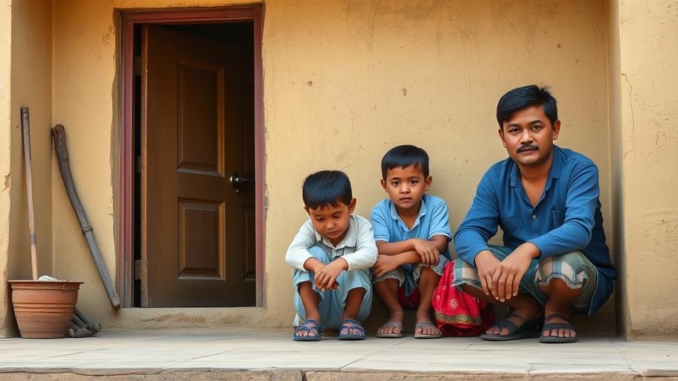
Summary
This article explores the profound impact of housing instability on children’s mental well-being, highlighting a recent study that links parental anxiety about housing loss to increased rates of depression and anxiety in children, particularly those under nine. The research emphasizes the need for greater support systems for families facing housing insecurity to mitigate the detrimental effects on children’s mental health. The findings underscore the importance of considering the mental health consequences for children when addressing housing instability.
Main Story
We often think of a roof as just providing shelter. But really, it’s so much more than that. It’s the bedrock of stability, security, and overall well-being, particularly for children growing up. And honestly, who doesn’t want that for kids? A recent study in JAMA Network Open really drives this point home, shining a light on the hidden costs of housing instability on young minds. It found a strong link between parents’ anxiety about losing their housing and a rise in mental health issues among their kids.
As economic times get tougher and, let’s face it, social safety nets seem to be fraying at the edges, more and more families are facing eviction, foreclosure, or just the constant worry of losing their home. And while we’ve known for a while how this affects adults, this study digs into the often-overlooked impact on children, and what it reveals is pretty concerning. You wouldn’t expect it to affect them as much, but it really does.
The researchers at the University of Pittsburgh looked at data from over 36,000 families, specifically focusing on that link between parental anxieties about housing loss and kids’ mental well-being. The picture they paint isn’t pretty: When parents are stressed about potential eviction or foreclosure, their children have a much higher risk of developing depression and anxiety disorders. It’s a heartbreaking ripple effect. This is especially true for younger kids, particularly those under nine. Now, depression isn’t usually that common in that age group, but the study showed a noticeable jump in depressive symptoms among young children whose parents were really stressed about housing. The increase in depression ranged anywhere from 10% to a shocking 35% in children whose parents were dealing with housing insecurity stress. Can you imagine?
Jamie Hanson, the lead author and a psychology professor, highlighted an important gap in our knowledge. “While we know that housing instability impacts adults, the effects on children haven’t been as well understood.” And that’s exactly what this research addresses. It shows how that parental stress seeps into the entire family, impacting the emotional and mental health of the most vulnerable members. Speaking of examples, I remember volunteering at a local shelter one winter, and you could just see the weight on the kids’ faces. It wasn’t just about being cold; it was the uncertainty and worry that really seemed to get to them.
Now, here’s something interesting: The study also found that housing-related stress doesn’t affect all mental health conditions equally. Depression and anxiety showed a clear link, yes, but there wasn’t a strong connection between housing loss stress and things like ADHD or behavioral problems. It suggests that the impact is strongest in internalizing disorders, where kids tend to bottle up their emotions. I suppose it makes sense in a way. They don’t always know how to articulate it.
The implications here are huge, plain and simple. We need better support systems to help families dealing with housing insecurity. If we can help alleviate the stress around housing, we could really make a difference in preventing or lessening mental health issues in children.
It’s not just about safe and affordable housing, though that’s key. We also need to offer resources that address the emotional and mental well-being of both parents and children. This could include things like access to mental health services, counseling, and support groups. And we need policies that protect families from eviction and foreclosure, like stronger tenant protections and bigger social safety nets, you know? It all plays a role in how stable children feel.
In a society that says it values the well-being of children, shouldn’t we be doing everything we can to ensure that they are mentally sound? It’s really about recognizing how connected housing security and mental health are. By tackling the root causes of housing instability and giving families the support they need, we can build a more stable and nurturing environment for children to grow up in, both emotionally and mentally. This study’s findings really are a call to action, urging policymakers, healthcare providers, and communities to work together to protect kids’ mental health by ensuring housing security for everyone. It’s an investment in our future, really.


So, a stable home equals a stable mind for kids, got it! Makes total sense. Now I’m picturing tiny houses for everyone, complete with miniature therapists on call. Maybe we should start a “Homes for Little Minds” GoFundMe? I’m only half kidding!
I love the “Homes for Little Minds” GoFundMe idea! It highlights the need for creative solutions. Perhaps we could explore community-based support programs within existing affordable housing initiatives. Sharing resources and building networks could make a real difference! What are your thoughts?
Editor: MedTechNews.Uk
Thank you to our Sponsor Esdebe
So, turns out a roof isn’t just a roof! Who knew it was also a kid’s happy pill? Maybe we should prescribe more houses instead of Prozac? Just spitballing here, folks.
I love that idea, you’re spot on! It’s wild to think that a stable home could be as crucial as medication for a child’s mental well-being. Perhaps a holistic approach, combining housing support with therapeutic resources, would be the most effective path forward. What initiatives do you think could bridge that gap?
Editor: MedTechNews.Uk
Thank you to our Sponsor Esdebe